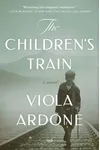Picture a Neapolitan storyteller who spun a tale of post-war hope and heartbreak—meet Viola Ardone! Born in Naples in 1974, this Italian author and educator has captivated readers with her lyrical prose and deeply human stories. Her international bestseller, The Children’s Train, shines a light on a forgotten chapter of history, blending emotional depth with historical insight. Ardone’s work, rooted in themes of identity and belonging, makes her a standout voice in contemporary Italian literature.
With a knack for crafting characters that feel like old friends, Ardone invites readers into worlds where personal struggles mirror societal shifts. Whether you’re a fan of historical fiction or just love a good story, her novels are a ticket to Naples’ vibrant, complex heart.
The Making of Viola Ardone
Viola Ardone grew up in Naples, a city of contradictions—gritty yet soulful, chaotic yet warm. She earned a degree in literature and worked in academic publishing, sharpening her storytelling instincts. Later, as a high school teacher of Latin and Italian, she honed her ability to connect with people through words. Naples, with its rich history and post-war scars, became a muse, inspiring her to weave personal narratives into broader cultural tapestries.
Ardone’s early career in publishing gave her a front-row seat to the literary world, but it was her love for teaching and storytelling that pushed her to write. Her novels reflect her deep understanding of human resilience, drawn from the stories of everyday people navigating extraordinary times.
Viola Ardone’s Unforgettable Stories
Ardone’s breakout novel, The Children’s Train (2019), is a heart-wrenching tale based on true events. Set in post-World War II Italy, it follows seven-year-old Amerigo Speranza, who leaves poverty-stricken Naples on a ‘happiness train’ to live with a northern foster family. The novel’s lyrical prose and child’s-eye view capture the pain of displacement and the search for belonging, earning comparisons to Elena Ferrante’s Neapolitan novels.
Before her international fame, Ardone penned La ricetta del cuore in subbuglio (2013), a tender exploration of love and self-discovery, and Una rivoluzione sentimentale (2016), which delves into personal transformation against societal change. Her later work, Oliva Denaro (2021), tackles gender and autonomy in 1960s Sicily, showcasing her versatility. Ardone’s style—vivid, empathetic, and laced with Neapolitan warmth—brings history to life through characters who linger long after the last page.
Her novels often blend historical events with intimate struggles, reflecting Italy’s north-south divide and the universal quest for identity. Critics praise her ability to balance stark realism with hope, making her stories both poignant and uplifting.
Why Viola Ardone Matters
Viola Ardone’s work resonates because it humanizes history. By spotlighting lesser-known stories like the ‘happiness trains,’ she bridges past and present, inviting readers to reflect on resilience and family ties. Her novels have struck a chord globally, with The Children’s Train inspiring a forthcoming Netflix film. Ardone’s influence extends beyond literature, encouraging conversations about Italy’s post-war recovery and the power of empathy in storytelling.
As a teacher and writer, she embodies the idea that stories can educate and heal. Her growing popularity cements her as a vital voice in Italian literature, appealing to readers who crave emotional depth and cultural insight.
- Born: 1974, Naples, Italy
- Key Works: The Children’s Train, Oliva Denaro, La ricetta del cuore in subbuglio
- Occupation: Author, high school Latin and Italian teacher
Snag The Children’s Train and dive into Viola Ardone’s heartfelt world of historical fiction!

